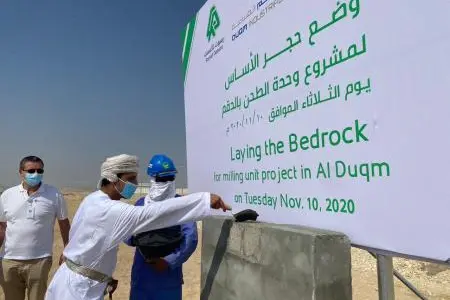PHOTO
Muscat: Raysut Cement Company (RCC), Oman’s largest cement manufacturer held a groundbreaking ceremony triggering the start of the construction of its new US$30 million grinding unit in Duqm in Oman.
The development of Duqm plant, a strategic expansion for the Muscat Stock Market-listed RCC will complement the company’s leadership in cement manufacturing adding another 1 million tonnes to the group output, taking the total to 7.4 million tonnes per annum.
“The groundbreaking is a milestone for RCC on two counts. It will contribute significantly to our ambitious capacity expansion targets of 10 million tonnes by 2022, expected to be further scaled up to 22 million tonnes in the near future. Second, it will help us generate more employment opportunities aiding our efforts to enhance social and economic progress in Oman,” said Group CEO, Joey Ghose.
Last year September, RCC had signed a land lease and Port of Terminal services agreement with Port of Duqm Company SAOC as part of the development of the new grinding unit.
“The new grinding unit will add more muscle to our capability to cater to the regional and global markets of RCC which continues to expand with new investments and acquisitions in Oman, Asia and East Africa, said Mr. Salim bin Ahmed bin Alawi Al Ibrahim, Acting Deputy Group CEO.
RCC’s investments are calibrated to ensure that these are in locations where demand is high and locally available additives are at close proximity, he said, adding that the Duqm unit will help the company consolidate and strengthen its presence in Oman and the neighboring Gulf markets.
RCC has been on a spree of expansion through M&As and new investments in Oman as well as globally in the past one year.
Last May 2019, RCC acquired Sohar Cement Company SAOG in Oman at USD 60 million. RCC had also announced developing a new green field 1.2 million tonnes per annum cement plant near Tbilisi, Georgia in Eastern Europe, at an investment outlay of US$200 million last October. The plant will be developed by RCC’s wholly-owned subsidiary in the UAE, Pioneer Cement Industries, which owns concession to limestone mines in Georgia.
RCC’s latest acquisition was a majority takeover of LafargeHolcim’s cement terminal at Thilafushi Islands in Maldives in October this year. Last year, the company had also announced investing US$40 million in a new grinding unit in Berbera, Somaliland in East Africa.
“Our aim is to develop RCC into a global leader in cement manufacturing, supply and exports, and the development of Duqm is an important element in this strategy. Our expansions are dovetailed to the opportunities that exist and are upcoming in the markets we focus on, like for instance in East Africa, a booming market for the next 50 years,” said Mr. Ghose.
Contact:
Mr. Mohammed Ahmed Barakat Al-Ibrahim
Senior Communications Manager
© Press Release 2020
Disclaimer: The contents of this press release was provided from an external third party provider. This website is not responsible for, and does not control, such external content. This content is provided on an “as is” and “as available” basis and has not been edited in any way. Neither this website nor our affiliates guarantee the accuracy of or endorse the views or opinions expressed in this press release.
The press release is provided for informational purposes only. The content does not provide tax, legal or investment advice or opinion regarding the suitability, value or profitability of any particular security, portfolio or investment strategy. Neither this website nor our affiliates shall be liable for any errors or inaccuracies in the content, or for any actions taken by you in reliance thereon. You expressly agree that your use of the information within this article is at your sole risk.
To the fullest extent permitted by applicable law, this website, its parent company, its subsidiaries, its affiliates and the respective shareholders, directors, officers, employees, agents, advertisers, content providers and licensors will not be liable (jointly or severally) to you for any direct, indirect, consequential, special, incidental, punitive or exemplary damages, including without limitation, lost profits, lost savings and lost revenues, whether in negligence, tort, contract or any other theory of liability, even if the parties have been advised of the possibility or could have foreseen any such damages.




















